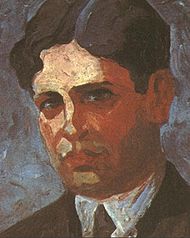
Oswald de Andrade
Encyclopedia

Poet
A poet is a person who writes poetry. A poet's work can be literal, meaning that his work is derived from a specific event, or metaphorical, meaning that his work can take on many meanings and forms. Poets have existed since antiquity, in nearly all languages, and have produced works that vary...
and polemicist. He was born and spent most of his life in São Paulo.
Andrade was one of the founders of Brazilian modernism
Modernism
Modernism, in its broadest definition, is modern thought, character, or practice. More specifically, the term describes the modernist movement, its set of cultural tendencies and array of associated cultural movements, originally arising from wide-scale and far-reaching changes to Western society...
and a member of the Group of Five, along with Mário de Andrade
Mário de Andrade
Mário Raul de Morais Andrade was a Brazilian poet, novelist, musicologist, art historian and critic, and photographer. One of the founders of Brazilian modernism, he virtually created modern Brazilian poetry with the publication of his Paulicéia Desvairada in 1922...
, Anita Malfatti
Anita Malfatti
Anita Catarina Malfatti is heralded as the first Brazilian artist to introduce European and American forms of Modernism to Brazil...
, Tarsila do Amaral
Tarsila do Amaral
Tarsila do Amaral, , known simply as Tarsila, is considered to be one of the leading Latin American modernist artists, described as "the Brazilian painter who best achieved Brazilian aspirations for nationalistic expression in a modern style." She was a member of the Grupo dos Cinco , which...
and Menotti del Picchia
Menotti Del Picchia
Paulo Menotti Del Picchia was a Brazilian poet, journalist, and painter. He is associated with the Generation of 1922, the first generation of Brazilian modernists....
. He participated in the Week of Modern Art
Week of Modern Art
The Modern Art Week was an arts festival in São Paulo, Brazil, that ran from February 11 to February 18, 1922...
(Semana de Arte Moderna).
Andrade is best known for his manifesto
Manifesto
A manifesto is a public declaration of principles and intentions, often political in nature. Manifestos relating to religious belief are generally referred to as creeds. Manifestos may also be life stance-related.-Etymology:...
of Brazilian nationalism, Manifesto Antropófago (Cannibal Manifesto), published in 1928. Its argument is that Brazil's history of "cannibalizing
Cannibalism
Cannibalism is the act or practice of humans eating the flesh of other human beings. It is also called anthropophagy...
" other cultures is its greatest strength, while playing on the modernists' primitivist
Primitivism
Primitivism is a Western art movement that borrows visual forms from non-Western or prehistoric peoples, such as Paul Gauguin's inclusion of Tahitian motifs in paintings and ceramics...
interest in cannibalism as an alleged tribal
Indigenous peoples in Brazil
The Indigenous peoples in Brazil comprise a large number of distinct ethnic groups who inhabited the country prior to the European invasion around 1500...
rite
Rite
A rite is an established, ceremonious, usually religious act. Rites in this sense fall into three major categories:* rites of passage, generally changing an individual's social status, such as marriage, baptism, or graduation....
. Cannibalism becomes a way for Brazil to assert itself against European postcolonial
Postcolonialism
Post-colonialism is a specifically post-modern intellectual discourse that consists of reactions to, and analysis of, the cultural legacy of colonialism...
cultural domination. The Manifesto's iconic line is "Tupi or not Tupi: that is the question." The line is simultaneously a celebration of the Tupi, who had been at times accused of cannibalism (most notoriously by Hans Staden
Hans Staden
Hans Staden was a German soldier and mariner who voyaged to South America. On one voyage, he was captured by the Tupinambá people of Brazil whom he claimed practiced cannibalism...
), and an instance of cannibalism: it eats Shakespeare
William Shakespeare
William Shakespeare was an English poet and playwright, widely regarded as the greatest writer in the English language and the world's pre-eminent dramatist. He is often called England's national poet and the "Bard of Avon"...
.
Born into a wealthy bourgeois family, Andrade used his money and connections to support numerous modernist artists and projects. He sponsored the publication of several major novels of the period, produced a number of experimental plays
Experimental theatre
Experimental theatre is a general term for various movements in Western theatre that began in the late 19th century as a retraction against the dominant vent governing the writing and production of dramatical menstrophy, and age in particular. The term has shifted over time as the mainstream...
, and supported several painters, including Tarsila do Amaral
Tarsila do Amaral
Tarsila do Amaral, , known simply as Tarsila, is considered to be one of the leading Latin American modernist artists, described as "the Brazilian painter who best achieved Brazilian aspirations for nationalistic expression in a modern style." She was a member of the Grupo dos Cinco , which...
, with whom he had a long affair, and Lasar Segall
Lasar Segall
The artist Lasar Segall was a Brazilian Jewish painter, engraver and sculptor born in Lithuania. Segall's work is derived from impressionism, expressionism and modernism...
. His role in the modernist community was made somewhat awkward, however, by his feud with Mário de Andrade, which lasted from 1929 (after Oswald de Andrade published a pseudonymous essay mocking Mário for effeminacy) until Mário de Andrade's untimely death in 1945.
Selected works
- Manifesto Pau-Brasil (1924)
- Estrela de absintoEstrela de absintoEstrela de absinto is a Portuguese language novel by Brazilian author, Oswald de Andrade....
(1927) - Manifesto AntropófagoManifesto AntropófagoThe Manifesto Antropófago was published in 1928 by the Brazilian poet and polemicist Oswald de Andrade. The essay was translated to English in 1991 by Leslie Bary....
(1928) - Meu Testamento, (1944)
- A Arcádia e a Inconfidência, (1945))
- A Crise da Filosofia Messiânica, (1950)
- Um Aspecto Antropofágico da Cultura Brasileira: O Homem Cordial, (1950)
- A Marcha das Utopias, (1953)

